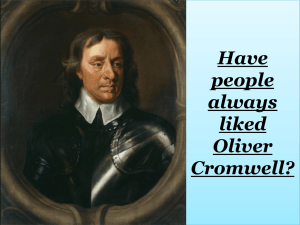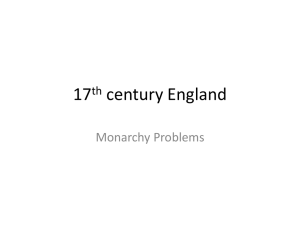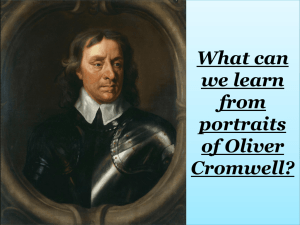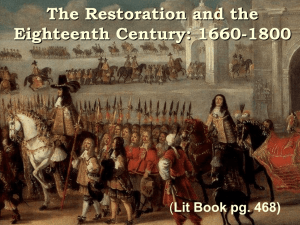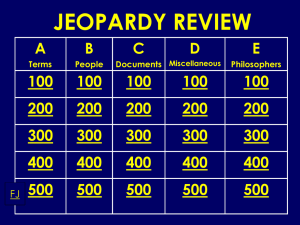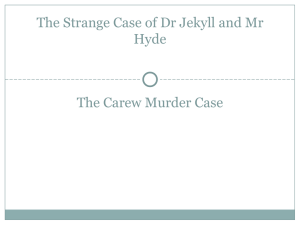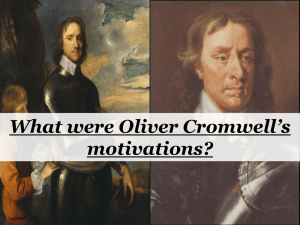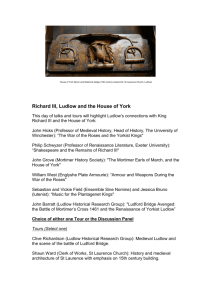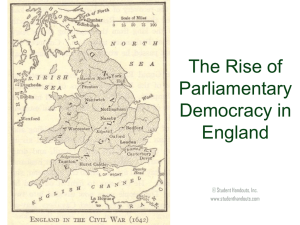source-based essay = Oliver Cromwell
advertisement
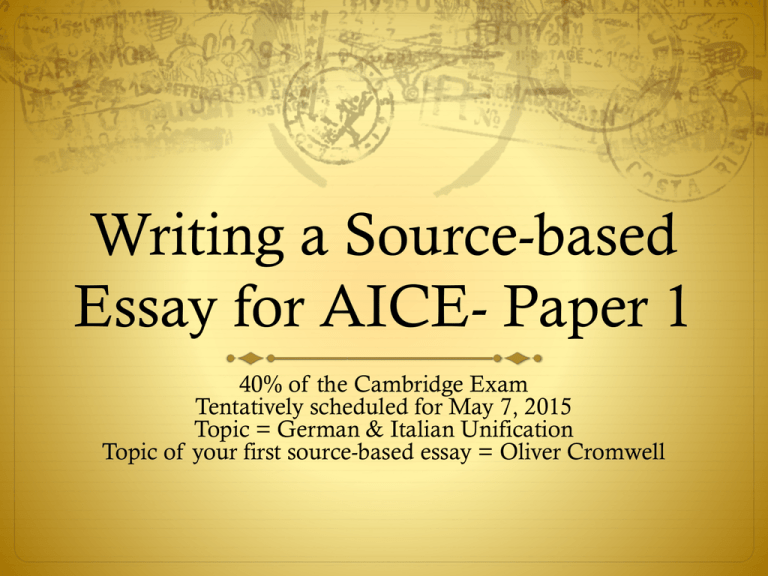
Writing a Source-based Essay for AICE- Paper 1 40% of the Cambridge Exam Tentatively scheduled for May 7, 2015 Topic = German & Italian Unification Topic of your first source-based essay = Oliver Cromwell Skills Required. Contextual knowledge Comprehension of source based content Cross-referencing at least 2 documents Understanding of provenance Weighing evidence in terms of bias and reliability Reaching a reasoned judgment Developing a focused and balanced argument The prompt will always consist of: A collection of source material, some primary, some secondary. No more than 600 words to read and analyze. A 2-part question: (a) – comparison of sources = 15 points (b) – analysis of sources = 25 points Part (a) of a Source-based Prompt Content knowledge & AWARENESS of provenance and historiography = 3 pts. A developed comparison of at least 2 sources = 8 pts. Evaluation of the sources = 4 pts. Total of 15 points for part (a) An introduction is not needed. Get straight to the similarities and differences. Conclude with 1 sentence. This is a “starter” paragraph Part (b) of a Source-based Prompt: Content knowledge & awareness of provenance = 5 pts Analysis – quality of answer = 8 pts. Grasp of sources – use of grouping = 6 pts. Source evaluation = 6 pts. Total of 25 points for part (b). Conclude with 3 to 4 sentences. MAKE SURE ALL SOURCES ARE ADDRESSED IN THE ESSAY. So, to apply this strategy to your O.C. essay: Part (a) “To what extent do Sources 1 and 2 agree about the character of Oliver Cromwell?” Compare the 2 sources – grasp what they are saying Evaluate the sources for bias, provenance, attitude towards O.C. Include background content knowledge and show an awareness of provenance O.C. Source-based Essay Part (b) “Oliver Cromwell was a cruel and ruthless man who was more villain than hero. How far do the sources support this statement?” Analysis – quality of answer Grouping the sources as a way of organizing answer Source evaluation – bias, provenance, historiography Content knowledge Source 1 – Edward Ludlow (Edmund Ludlowe) Religious radical, republican, and regicide Military man, first served with a Wiltshire regiment, later (after 1645) served in the N.M.A. Baptist (Puritan) Levellor, MP from Wiltshire, assisted with Pride’s Purge, fought in Ireland with the NMA Refused to sign the Protectorate appointment, criticized Cromwell as having taken absolutism too far, circulated pamphlets critical of the Lord Protectorate. He tried to prevent the assumption of power by O.C. He was ordered home from Ireland in 1656, interviewed by O.C., exiled to Essex and heavily watched for suspicious activity designed to overthrow O.C. and reinstate the “Commonwealth.” Opposed to the Restoration – he was a Republican – opposed to any strong ruler (King or Protector ) as head of state. Forced to flee to Switzerland where he lived in exile. Probably the last survivor of the regicides. An autobiography = A Voyce from the Watch Tower … turned into a memoir: The Memoirs of Edmund Ludlow in 1698-9. Censored by fellow Republicans to remove militant Puritan sentiments. Corrected in 1970 when portions of the original documents were revealed. Come, I will put an end to your chatter. You are no Parliament. What does O.C. mean by these statements? What do historians think Ludlow thought of these statements? Can you add a date to this incident? What were O.C.’s motives for disbanding this Parliament? What is Ludlow’s attitude towards Cromwell? How does this quote compare to Hyde’s statements in Source 2? Edward Hyde, Lord Clarendon Lawyer and MP to Short and Long Parliaments Opposed to some of Charles I’s new taxes, but opposed to Puritans agenda to diminish the power of the King A behind-the-scenes moderate advisor of the King, upset over the King’s extreme action in arresting members of P. A member of the Royalist Council of War, never fought, but was with Charles in Scotland. Kept pushing for a Constitution that recognized the power of Parliament – which angered Charles I. To get rid of him, Charles appointed him guardian of the Prince of Wales (young Charles II.) Forced to join Henrietta in Paris. He wrote a history: History of the Rebellion and Civil Wars In England – hoping to warn future Kings of the danger of opposing Parliament. Stayed with Charles II throughout the 1650s, hoping to prevent him from converting to Roman Catholicism. A reasonable, Parliament-minded supporter of the English monarchy. Given a title, 1st Lord of Clarendon by Charles II after the Restoration. His daughter, Anne, becomes pregnant by James, the brother of Charles II. A hasty marriage. Fall from power: he criticized the hedonistic behavior of Charles II and suffered trumped charges that resulted in the loss of his title and his office in government. He fled to France and worked on his History book. History book considered flawed and rife with bias. It reads like a bitter expose of a man determined to vindicate his actions. …greatest liar alive….also a stirrer,…courage and worked hard….more wickedness…even his wickedness has a great spirit….forced foreign countries to obey him, and he ruled with an army that worshipped him. Edward Hyde, Lord Clarendon What is Hyde’s assessment of O.C.? Hyde’s provenance? Could O.C.’s wickedness be related to the disbanding of Parliament mentioned by Ludlow? It is clear from Ludlow that O.C.’s army will do his bidding. A general guide to writing a paragraph: P = make ONE point PER paragraph E = explain that point E = give an example of the point or an illustration of the point R = relate the point back to the prompt A comparison of Sources 1 and 2 Ludlow is a supporter-turned-hater who exposes O.C.’s willingness to disband P and NOT wait on them to put a Constitution in place… Hyde is a Royalist supporter who actually has some respect and admiration for O.C. – and criticizes him, as well. Both “haters” but one criticizes and the other recognizes O.C.’s courage and passion. Now, what to do about the “historians?” For Cromwell Neutral A supporter can “turn” enemy. .25 Hyde Even an enemy has something good to say. .25 Historian 1952 Seems to want to set the record straight. Against Cromwell 1.0 Ludlow .5 Hyde .5 Historian 1952 Source 4 Source 5 What is the modern, more moderate attitude towards Cromwell? .5 for Cromwell +2 points? 2.0 against O.C. Do these documents present a balanced treatment of the man, Oliver Cromwell? Keep in mind that Hyde had a run-in with Charles and fell from power. Analyzing a source: Who wrote it? When was it written? What is the context? (What was happening at the time or what was the typical attitude of the times?) Who was the intended audience? Motive – why was it written? What does it actually say? How strong is the argument? How does what it says compare with our subject knowledge and WHAT OTHER SOURCES SAY? Common Weaknesses Over-reliance on basic comprehension of source contents Face-value interpretation only Absence of contextual knowledge Lack of effective cross-referencing between sources Assumptions about bias Unsupported assertions Lack of focus on the specific question, lack of balance, or disjointed Failing to use all the sources in part (b). Using the wrong sources for part (a). To re-cap: The O.C. essay will consist of this prompt: (a) “To what extent do Sources 1 and 2 agree about the character of Oliver Cromwell?” (15 points) (b) “Oliver Cromwell was a cruel and ruthless man who was more villain than hero. How far do the sources support this statement?” (25 points) Of course, the grade will be worth more than 40 actual points. I will make it a test grade worth 160 points. Some reminders: Even though your five sources seem short, there is a wealth of information to be gleaned from them. Don’t be fooled by their brevity. Please do not disregard this truth. Go through each with a “fine-toothed” style. You need to become very familiar with each of them. You must use all five sources in the essay. You will have one hour to write this essay in class, when I am finished teaching the English Civil Wars, the Interregnum, the Restoration, and the Glorious Revolution. You will also have the “Tombstone” test on this unit. There are two family trees on the test AND a map.
